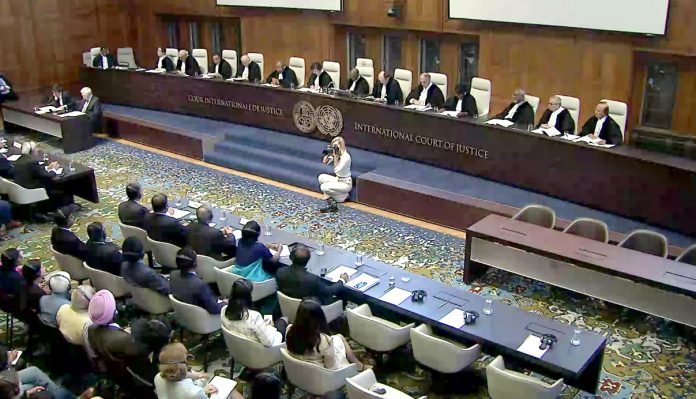ISLAMABAD, July 17th 2019: The International Court of Justice (ICJ), the principal judicial organ of the United Nations, Wednesday announced its findings spreading over a 42-page document in the Indian spy Kulbhushan Jadhav’s case (India vs Pakistan).
During a public sitting at the Peace Palace President of the Court Judge Abdulqawi Ahmed Yusuf, who belonged to Somalia, read out the Court’s findings in the presence of other fellow judges, Pakistan and Indian sides, besides a number of other attendees.
Attorney General for Pakistan Anwar Mansoor Khan, Director General (South Asia and South Asian Association for Regional Cooperation) Mohammad Faisal, Ambassador of Pakistan to the Kingdom of the Netherlands, lead legal counsel Khawar Qureshi and others were present during the announcement.
The ICJ directed that copies of its ruling should be transmitted to the Governments of India and the Islamic Republic of Pakistan.
The ICJ had summed up its findings in the last part of the 42-page document with succinct reasons, containing eight paras addressing arguments of the both parties and containing the number of member judges who had voted or against in the ruling.

In the earlier part, the ICJ had in details deliberated on the contention of the both sides regarding its jurisdiction.
The International Court of Justice (ICJ) was established by the United Nations Charter in June 1945 and began its activities in April 1946. Also known as the “World Court”, it is the only court of a universal character with general jurisdiction.
The seat of the court is located at the Peace Palace in The Hague (Netherlands). Of the six principal organs of the United Nations, it is the only one which was not located in New York.
The court has a two-fold role: first, to settle, in accordance with international law, legal disputes submitted to it by States; and, second, to give advisory opinions on legal questions.
The court comprising 15 judges are elected for a nine-year term by the General Assembly and the Security Council of the United Nations.
These organs vote simultaneously but separately. In order to be elected, a candidate must receive an absolute majority of the votes in both bodies.
In order to ensure a degree of continuity, one third of the Court is elected every three years. Judges are eligible for re-election. In case a judge died or resigned during his or her term of office, a special election is held as soon as possible to choose a judge to fill the unexpired part of the term.
Elections are held in New York (United States of America) during the annual autumn session of the General Assembly.
The judges elected at a triennial election commence their term of office on 6 February of the following year, after which the Court holds a secret ballot to elect a President and a Vice-President to hold office for three years. A state which is party to a case, could nominate its ad hoc judge. All the judges are bound by their declaration to remain impartial to all issues.
Independent of the United Nations Secretariat, it is assisted by a Registry, its own international secretariat, whose activities are both judicial and diplomatic, as well as administrative. The official languages of the Court are French and English.


































